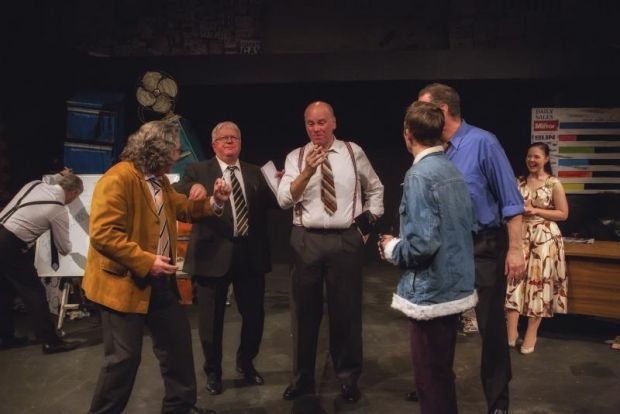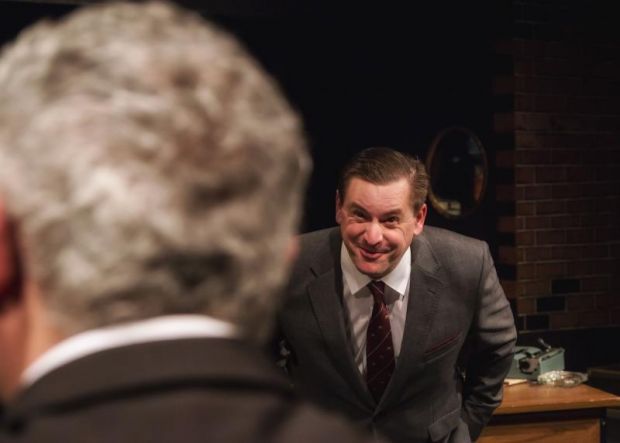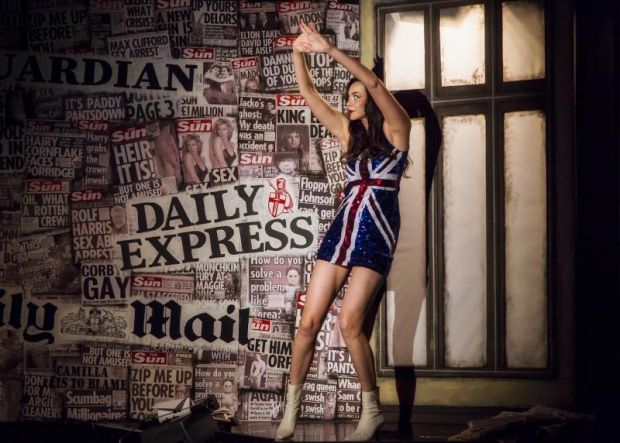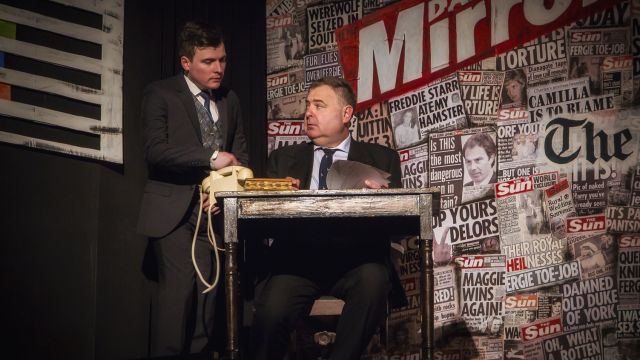Ink
‘Find people like you: the spurned, the spited, the overlooked,’ says a young Rupert Murdoch to his new editor, Larry Lamb. He includes himself in that group, and it’s a central theme and Murdoch’s opportunity in this Australian premiere of Ink, the award-winning West End and Broadway play detailing the rise of The Sun newspaper in the UK at the end of the 1960s.
Murdoch here is ignored and dismissed by old-school newspaper owners and editors, and he’s out to prove them wrong. Joshua Coldwell is superb as the young Rupert, displaying supreme confidence and determination – yet unafraid to show his humanity when things start to get too personal. Coldwell strides onto the stage, pulling attention every time – and here, Murdoch is a man to admire and respect.
Bart Csorba’s Larry Lamb is no sheep, instead an ambitious editor appointed to transform the newspaper. Csorba is convincing as a man who must be many things to many people: his first act antics require persuasion, fast thinking and quicker talking – and in a memorable scene, some decent dad-dancing. After the interval, Csorba peels back a few layers of his tough skin to reveal his angst in balancing what the paper should do and what he would rather not do. Amongst the comedy and action, there is real emotion, and Csorba fidgets, frets, and stumbles over words that seem opposite to what his face is saying.

This is one of the brilliances of James Graham’s writing, that it presents thorny issues such as media ethics in human form yet achieves this without moralising or preaching – it presents all sides of debate, and it’s up to the audience to decide.
The old-school editor of the Mirror, Hugh Cudlipp (Steve Marvenek) is the ghost of the past, but he doesn’t yet realise it. Marvellous Marvenek is steadfast, straight-faced, and nails the voice of a Welshman in an English Gentleman’s club. His scene with Csorba in a church is genuinely moving, a moment of intimacy amidst the calm overconfidence that normally exudes from him.
Kate Anolak is brilliant as the first women’s editor, Joyce Hopkirk: bold, pointed, and seemingly fearless in the man’s world of newspapers – particularly in the 1960s. No-hack Anolak brings so much power to Hopkirk (and just as much, though more understated, as Muriel McKay, the wife of Murdoch’s deputy). Just as with the other leading characters, Anolak shines even more when she battles her personal ethics with that of the paper, trying to find a balance between sexism and sales.

Gary George excels as Lamb’s right-hand man: the bridge between new and old, careful of who should cross. John Rosen is excellent as the sports writer, Frank Nicklin (with a nod to Trent Crimm), and Charlie Milne’s photographer brings nuance to what could have been a two-dimensional role.
Maxwell Whigham demonstrates his versatility and productivity, and has far too much of a good time in his handfuls of characters that season the narrative – his psychic is hilarious, his editor-in-waiting devious. And Sarika Young, as Stephanie Kahn/Rahn, gives the audience a lot to contemplate in her ultimately heart-breaking performance.
Co-directors Robert Bell and Rebecca Kemp have assembled a strong and capable cast that barely has a weak link amongst them – even Csorba’s wandering Yorkshire accent doesn’t distract from how they all work so well together. The main desk pushed back against one side has part of the audience seeing more necks than faces, but this is always a challenge with a thrust stage and Kemp and Bell generally do well in moving their cast around, making good use of the performing spaces, pairing the floor and the mezzanine to present dual locations. The directors have a big play to pace – the first act rollicks through the exuberance of starting fresh, as Lamb and his team shape a paper that is less driven by a need to inform, as entertain. The pace is slowed after the interval, allowing the audience to digest the meanings of the first act’s headlines, and then Bell and Kemp cleverly reveal the human cost of those stories.

Normajeane Ohlsson’s exceptional set design is just as important a player as the cast, its collage of newspaper front pages and mastheads offset by grimy, well-worn desks and cabinets beneath them. The symbolism extends to where the scene is performed – the locations for the establishment on the mezzanine; the working-class start-ups always beneath them.
Phil Short’s toe-tapping period music composed for this production bookends each scene, and his sound design is a reminder of the mechanical origins of newspaper publishing that Murdoch would effectively dismantle within two decades. Stephen Dean’s lighting design defines the performing spaces wide and intimate, and does much to guide the emotional tones.
Ink is often hilarious, but like all good comedy, is rooted in truth – and whilst sometimes barely-believable, most of this story actually happened. Which means it hits harder when choosing newspaper sales over journalistic integrity; more distressing when the impacts on people are shown. This play isn’t just an observation of fifty years ago, but how exaggerated yet normalised that is today.

This Ink is never dry, and is more than a mirror from the past, it’s the sunlight on how we got to where we are today, an answer to the question Lamb asks of his news editor, Brian McConnell: ‘what if we treated the news as if it were a crime thriller, a mystery? Plot twists, whodunnits!’.
By Mark Wickett
(Mark will be directing for the Theatre Guild in 2024)
Photographer: Richard Parkhill
Subscribe to our E-Newsletter, buy our latest print edition or find a Performing Arts book at Book Nook.

